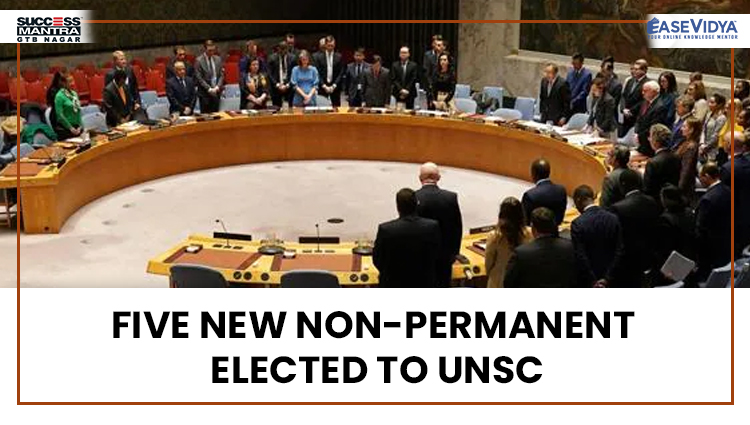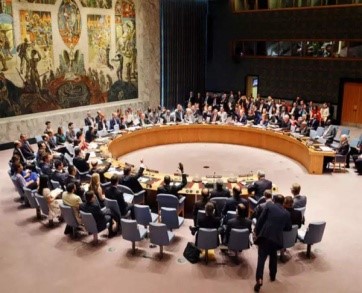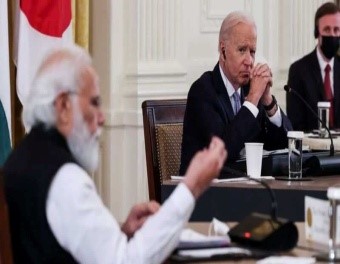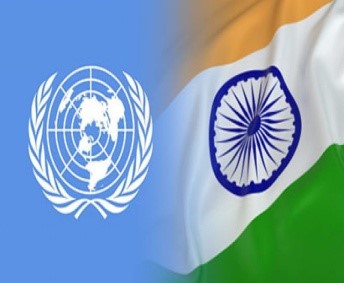
FIVE NEW NON PERMANENT ELECTED TO UNSC
FIVE NEW NON-PERMANENT ELECTED TO UNSC
As India began her two-year tenure as a non-permanent member of the UN Security Council in January 2021, New Delhi’s presence at the horse-shoe table provided the “much-needed” balance at a time when the powerful organ of the world body grappled with major geo-political crises, including in war-torn Afghanistan. When India took up the seat at the 15-nation Council in the beginning of the year, the world was still reeling with the COVID-19 pandemic that ravaged nations and slaughtered economies. Just as economies and nations were beginning to open up, the Omicron variant’s lightning-speed spread across the world has given more reason to worry.
The United Nation Security Council (UNSC) got five new non permanent members (Albania, Brazil, Gabon, Ghana and the United Arab Emirates). Estonia, Niger, St Vincent and the Grenadines, Tunisia and Vietnam finished their terms recently. Albania is joining for the first time while Brazil is taking an 11th turn. Gabon and Ghana each have been on the council three times before and the UAE once. More than 50 of the UN’s 193 member countries have never been elected to the council since its formation.

The Security Council was established by the UN Charter in 1945. It is one of the six principal organs of the United Nations. The other 5 organs of the United Nations are—the General Assembly (UNGA), the Trusteeship Council, the Economic and Social Council, the International Court of Justice, and the Secretariat. Its primary responsibility is to work to maintain international peace and security. The council is headquartered at NewYork.
Members: The council has 15 members: the five permanent members and ten non-permanent members elected for two-year terms. The five permanent members are the United States, the Russian Federation, France, China and the United Kingdom. India, for the eighth time, has entered the UNSC as a non-permanent member last year (2021) and will stay on the council for two years i.e 2021-22. Each year, the General Assembly elects five non-permanent members (out of ten in total) for a two-year term. The ten non-permanent seats are distributed on a regional basis. The council's presidency is a capacity that rotates every month among its 15 members.
Voting Powers: Each member of the Security Council has one vote. Decisions of the Security Council on matters are made by an affirmative vote of nine members including the concurring votes of the permanent members. A "No" vote from one of the five permanent members blocks the passage of the resolution. Any member of the United Nations which is not a member of the Security Council may participate, without vote, in the discussion of any question brought before the Security Council whenever the latter considers that the interests of that member are specially affected.
Current Affairs Notes By Success Mantra Coaching Institute GTB Nagar Delhi CLICK HERE
Permanent and Non-Permanent Members
The Council is composed of 15 Members:
- Five permanent members: China, France, the Russian Federation, the United Kingdom, and the United States.
- Ten non-permanent members elected for two-year terms by the General Assembly (with the end of term year): Belgium (2020), Côte d’Ivoire (2019), Dominican Republic (2020), Equatorial Guinea (2019), Germany (2020), Indonesia (2020), Kuwait (2019), Peru (2019), Poland (2019), South Africa (2020).

Selection of non-permanent members of the Security Council
Each year, the General Assembly elects five non-permanent members (out of ten in total) for a two-year term.
- The ten non-permanent seats are distributed on a regional basis:
- Five for African and Asian countries;
- One for Eastern European countries;
- Two for Latin American and Caribbean countries;
- Two for Western European and other countries.
Aspiring member needs the vote of two-thirds of the 193 UN General Assembly members to win a non-permanent seat on the UNSC. Article 23 of the UN Charter concerns the composition of the Security Council.
INDIA IN THE UNSC
India took active part in the formulation of the Universal Declaration of Human Rights (UDHR) in 1947-48 and raised its voice passionately against racial discrimination in South Africa. India has played its part in formulating decisions on several issues such as admitting former colonies to the UN, addressing deadly conflicts in the Middle East and maintaining peace in Africa. It has contributed extensively to the UN, particularly for the maintenance of international peace and security. India has taken part in 43 Peacekeeping missions with a total contribution exceeding 160,000 troops and a significant number of police personnel. India's population, territorial size, Gross Domestic Product (GDP), economic potential, civilisational legacy, cultural diversity, political system and past and ongoing contributions to UN activities make India’s demand for a permanent seat in the UNSC completely rational.

ISSUES WITH UNITED NATIONS SECURITY COUNCIL
- Absence of Records and Texts of Meetings: The usual UN rules don’t apply to the UNSC deliberations and no records are kept of its meetings. Additionally, there is no “text” of the meeting to discuss, amend or object.
- Powerplay in UNSC: The veto powers that the UNSC’s five permanent members enjoy are an anachronism in this age. The UNSC in its current form has become a constraint in understanding the international changes and dynamics in the area of human security and peace.
- Divisions Among the P5: There is a deep polarisation within the UN’s membership, so decisions are either not taken, or not heeded. Frequent divisions within the UNSC P-5 end up blocking key decisions.
- Example: With the coronavirus pandemic emergence, the UN, the UNSC, and World Health Organisation failed to play an effective role in helping nations deal with the spread.
- An Underrepresentation Organisation: The absence in the UNSC of the globally important countries – India, Germany, Brazil and South Africa - is a matter of concern.
PRAVAHINI Current Affairs Notes By Success Mantra Coaching Institute GTB Nagar Delhi CLICK HERE
CONCLUSION
The imbalances in power relationships among P5 and the rest of the world needs to be corrected urgently. Also, it is needed to reform the Security Council through an expansion in permanent and non-permanent seats to enable the UN organ to better deal with the “ever-complex and evolving challenges” to the maintenance of international peace and security. India as the current one of the non-permanent members of the UNSC can start by drafting a resolution containing a comprehensive set of proposals for reforming the UNSC. It can further approach other like-minded countries (like the G4: India, Germany, Japan and Brazil) and keep growing its circle of support till sufficient numbers of countries are together to reach out to the whole UNGA to propose the resolution with a realistic chance of winning the vote.
TEST YOURSELF
Q.1 Recently, (in Jan, 2022) 5 countries got elected to the United Nations Security Council (UNSC). Which of the following is not one of them?
- Albania
- United Arab Emirates
- Saudi Arabia: ANSWER
- None of the above-mentioned
Q.2 Which of the following five countries have the permanent membership of the United Nations Security Council (UNSC)?
- USA, UK, France, India & China
- France, UK, Russia, India & China: ANSWER
- Russia, UK, France, India & UAE
- USA, Germany, France, India & China
Q.3 Which of the following articles of the United Nations Charter concerns the composition of the United Nations Security Council (UNSC)?
- Article 23: ANSWER
- Article 32
- Article 13
- None of the above
Q.4 Consider the given options & state which of the following is the current Indian Ambassador to the United Nations?
- Syed Akbaruddin
- TS Tirumurti: ANSWER
- Harsh Vardhan Shringla
- None of the above
Q.5 Which of the following statements is/are incorrect in the reference to the United Nations Security Council (UNSC)?
- The Security Council was established by the UN Charter in 1951. It is one of the six principal organs of the United Nations: ANSWER
- Its primary responsibility is to work to maintain international peace and security.
- The council has 15 members: the five permanent members and 10 non-permanent members elected for two-year terms.
- All of the above













0 Comment